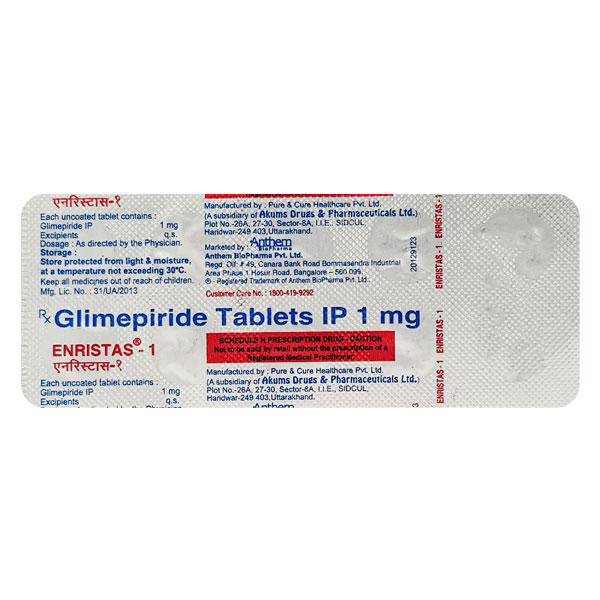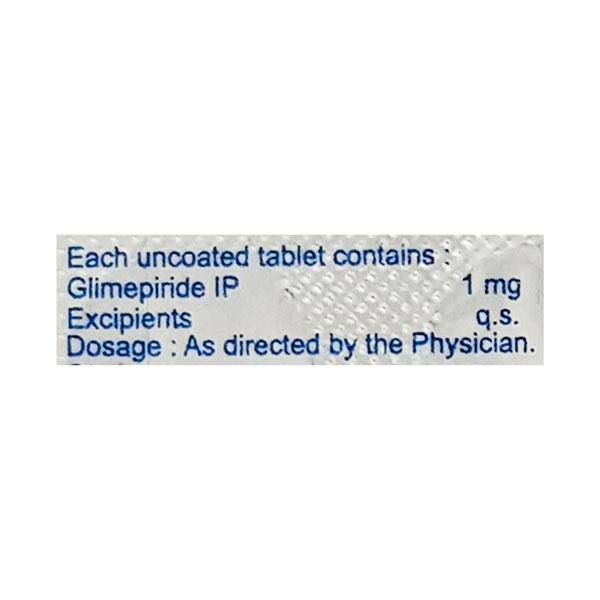ANJANI MEDICAL
Enristas 1mg Tablet 10'S
Enristas 1mg Tablet 10'S
Couldn't load pickup availability
INTRODUCTION ABOUT ENRISTAS 1MG TABLET
ENRISTAS 1MG TABLET is used for the management of Type II diabetes mellitus when diet and exercise alone does not result in adequate blood sugar control. It contains Glimepiride which belongs to the group of medicines called Anti-diabetic agents. It stimulates the pancreas to secrete more insulin (a hormone involved in glucose metabolism). It also makes our body more sensitive to insulin which helps in digesting the circulating sugars (glucose) in the blood, thereby reducing blood sugar levels.
Along with the therapy, your doctor might ask you to make certain lifestyle changes such as following a healthy diet, regular physical exercise and quitting alcohol consumption. Before taking the medicine, inform your doctor if you have any liver or kidney problems. You must also inform your doctor if you have any hormonal problems, genetic disorders (such as G6PD deficiency) or if you are malnourished, starved, on an irregular diet. ENRISTAS 1MG TABLET is not suitable for use in patients with type I diabetes mellitus. Consult your doctor if you are pregnant or planning to become pregnant or breastfeeding.
The most common side effect of taking ENRISTAS 1MG TABLET is hypoglycemia (low blood sugar levels) which can be identified through symptoms such as increased hunger, sweating, shakiness, weakness or an irregular heartbeat. To avoid this, your doctor will periodically monitor your blood sugar levels and adjust the dose of the medicine accordingly. You can also carry a sugary snack (such as biscuits, glucose drinks or sweet candies) along with you as a precaution and have them immediately if you experience any signs of hypoglycemia. However, consult your doctor if there is no improvement in your condition.
USES OF ENRISTAS 1MG TABLET
- Used to manage Type II diabetes mellitus
HOW ENRISTAS 1MG TABLET WORKS
ENRISTAS 1MG TABLET stimulates the pancreas to secrete more insulin (a hormone involved in glucose metabolism). It also makes our body more sensitive to insulin which helps in digesting the circulating sugars (glucose) in the blood, thereby reducing blood sugar levels.
DIRECTIONS FOR USE
- Take ENRISTAS 1MG TABLET preferably after meals or as advised by your physician
- Swallow the medicine with a glass of water. Do not crush or chew the medicine.
- Your doctor will decide the correct dose and duration of therapy for you depending upon your age, body weight and disease condition
- Do not stop taking ENRISTAS 1MG TABLET unless your doctor advice you to stop
SIDE EFFECTS OF ENRISTAS 1MG TABLET
Common side effects of ENRISTAS 1MG TABLET:
- hypoglycemia (low blood sugar levels)
Stop taking ENRISTAS 1MG TABLET and contact your doctor immediately if you experience any of the following side effects:
- severe allergic reaction (inflammation of blood vessels, skin rash, swelling of the face, eyelids, lips, tongue or throat which causes difficulty in breathing or swallowing, drop in blood pressure)
- signs of liver problems (such as fever, yellowing of skin and whites of the eyes, weakness, fatigue, weight loss and loss of appetite)
- increased skin sensitivity to sun
- signs of severe decrease in blood sugar level (such as confusion, headache, excessive sweating, clammy skin, trembling, weakness, double vision, excessive hunger, nausea, vomiting, problems in sleeping, feeling agitated, unable to concentrate, drowsiness, slowed reactions, depression, trouble seeing or speaking, paralysis, numbness, dizziness, hallucinations, difficulty in breathing, slowed or faster heartbeat with chest pain)
WARNING & PRECAUTIONS
PREGNANCY
Monitoring requiredThere are no adequate and well-controlled studies in pregnant women. ENRISTAS 1MG TABLET should be used during pregnancy only if the potential benefit justifies the potential risk to the fetus.
BREASTFEEDING
Consult your doctorIt is not known whether ENRISTAS 1MG TABLET is excreted in human milk. Consult your doctor for advice.
DRIVING AND USING MACHINES
Use with CautionDo not drive or operate any heavy tools or machines if your ability is affected by the medicine.
ALCOHOL
Consult your doctorAvoid consumption of alcohol while taking ENRISTAS 1MG TABLET as it may increase the risk of unwanted side effects.
KIDNEY
Consult your doctorENRISTAS 1MG TABLET is not recommended for use in patients with severe kidney problems. It should be used with caution in patients with other kidney problems.
LIVER
Consult your doctorENRISTAS 1MG TABLET is not recommended for use in patients with severe liver problems. It should be used with caution in patients with other liver problems.
ALLERGY
ContraindicatedDo not take ENRISTAS 1MG TABLET if you are allergic to Glimepiride or any other ingredients of this medicine.
USE IN PEDIATRICS
ContraindicatedENRISTAS 1MG TABLET is not recommended in pediatric patients because of its adverse effects on body weight and hypoglycemia.
USE IN GERIATRICS
Use with CautionENRISTAS 1MG TABLET should be used with caution in elderly patients (aged above 65 years).
OTHERS
ENRISTAS 1MG TABLET is not recommended for use if you:
- have type I diabetes mellitus
- have diabetic ketoacidosis
Before taking ENRISTAS 1MG TABLET, inform your doctor if you:
- are recovering from any injury, operation, infections or from any form of stress
- have G6PD deficiency
- have sugar intolerance
- are malnourished, starved, on an irregular diet, or feeling weak
- had made any sudden changes to diet
- are on fasting
- perform extreme physical exercises without proper carbohydrate intake
- have hormonal problems (Ex. disorders of pituitary gland, adrenal cortex or thyroid gland)
INTERACTIONS
A. Drug-Drug interactions:
Before taking ENRISTAS 1MG TABLET, inform your doctor if you are taking any of the following medicines:
- Anti-diabetics agents (Ex. insulin or metformin)
- Non-steroidal anti-inflammatory agents (Ex. aspirin, ibuprofen, phenylbutazone, azopropazone, oxyphenbutazone)
- Antibiotics (Ex. amikacin, nitrofurantoin, sulfamethoxazole, tetracyclines, chloramphenicol, ciprofloxacin, clarithromycin)
- Anti-fungal agents (Ex. fluconazole, miconazole)
- Anti-coagulants (Ex. warfarin)
- Class II AASs (Ex. nandrolone, oxymethalone)
- Hormone replacement (Ex. testosterone)
- Benzamides (Ex. moclobemide, isocarboxazid, phenelzine, tranylcypromine, fluoxetine)
- Anti-lipidemic agents (Ex. fenofibrate, nicotinic acid, colesevelam)
- Angiotensin-converting enzyme (ACE) inhibitors (Ex. enalapril, lisinopril, ramipril)
- Antihypertensives (Ex. atenolol, propranolol, telmisartan, olmesartan, clonidine, guanethidine and reserpine)
- Class 1a anti-arrhythmic agent (Ex. disopyramide)
- Anti-gout agents (Ex. allopurinol, probenecid, sulfinpyrazone)
- Alkylating agents (Ex. cyclophosphamide, ifosfamide, trofosfamide)
- Anticonvulsants (Ex. fenfluramine)
- Hemorrheologic agents (Ex. pentoxifylline)
- Enzyme inhibitor (Ex. tritoqualine)
- Alpha blockers (Ex. prazosin, doxazosin)
- Hormonal replacement therapy (Ex. estradiol)
- Thiazide diuretics (Ex. hydrochlorothiazide)
- Hormones (Ex. Levothyroxine)
- Antipsychotics (Ex. chlorpromazine, prochlorperazine, lithium)
- corticosteroids (Ex. prednisolone, betamethasone)
- Bronchodilators (Ex. salbutamol, terbutaline)
- Alpha- and beta-adrenergic agonists (Ex. adrenaline)
- Laxatives (Ex. lactulose, liquid paraffin)
- Anti-convulsant (Ex. phenytoin)
- Barbiturates (Ex. phenobarbital)
- Carbonic anhydrase inhibitors (Ex. azetazolamide)
- Glycogenolytic agents (Ex. Glucagon, diazoxide)
- H2 blockers (Ex. Cimetidine)
Overdosage:
If you or anyone else accidentally took more of ENRISTAS 1MG TABLET, you may experience the signs of hypoglycemia (such as increased hunger, sweating, headache, feeling clammy, restless or aggressive, shakiness, fast heartbeat and confusion). To manage this, consume any sugary food immediately. If the symptom did not improve or worsens contact your doctor immediately.
SYNOPSIS
| Drug | : | Glimepiride |
| Pharmacological Category | : | Sulfonylureas |
| Therapeutic Indication | : | Type 2 diabetes mellitus |
| Dosage Forms | : | Tablet |
MORE INFORMATION
FAQs ABOUT ENRISTAS 1MG TABLET
Q: What is ENRISTAS 1MG TABLET used for?
A: ENRISTAS 1MG TABLET is an antidiabetic medicine used to manage Type II diabetes mellitus when diet, exercise and lifestyle changes alone does not result in adequate response.
Q: How and when to take ENRISTAS 1MG TABLET?
A: Take ENRISTAS 1MG TABLET preferably after meals or as advised by your physician. Swallow the medicine with a glass of water. Do not crush or chew the medicine. Your doctor will decide the correct dose and duration of therapy for you depending upon your age, body weight and disease condition.
Q: How long should I take ENRISTAS 1MG TABLET?
A: You need to take ENRISTAS 1MG TABLET as long as your doctor or physician prescribes you the medicine.
Q: What is the best time to take ENRISTAS 1MG TABLET?
A: ENRISTAS 1MG TABLET must be taken with meals to avoid gastrointestinal side effects. Consult your doctor for advice.
Q: What to do if I forgot to take a dose of ENRISTAS 1MG TABLET?
A: If you forgot to take a dose of ENRISTAS 1MG TABLET, take it as soon as you remember. However, if it is time for the next dose of ENRISTAS 1MG TABLET, skip the missed dose and take the next one regularly. Do not take a double dose to compensate the missed ones.
Q: What are the most common side effects of taking ENRISTAS 1MG TABLET?
A: The most common side effects of taking ENRISTAS 1MG TABLET is hypoglycemia. To avoid this, your doctor will periodically monitor your blood sugar levels and adjust the dose of ENRISTAS 1MG TABLET accordingly. You can also carry a sugary snack (such as biscuits, glucose drinks or sweet candies) along with you as a precaution and have them immediately if you experience any signs of hypoglycemia.
Q: Can I stop taking ENRISTAS 1MG TABLET without consulting your doctor?
A: No. You should not stop taking ENRISTAS 1MG TABLET without consulting your doctor because it may lead to reversal of symptoms. If you feel better after using ENRISTAS 1MG TABLET, consult your doctor for advice.
Q: Will taking a higher dose of ENRISTAS 1MG TABLET be more effective?
A: No, taking a higher dose of ENRISTAS 1MG TABLET will not be effective rather it can lead to unwanted side effects. Always take the dose prescribed by your doctor. If the prescribed dose is not effective for you, consult your doctor for advice. Your doctor might increase the dose or suggest an alternative therapy.
Q: What precautions do I need to follow while taking ENRISTAS 1MG TABLET?
A: Before taking ENRISTAS 1MG TABLET, inform your doctor if you have any liver or kidney problems. You must also inform your doctor if you have hormonal problems, genetic problems (surgery in the gut) or if you are malnourished. It is not suitable for use in patients with type I diabetes mellitus.
Q: Can I take medication for high blood pressure along with ENRISTAS 1MG TABLET?
A: It is not advisable to take medicines to control blood pressure while taking ENRISTAS 1MG TABLET without consulting your doctor. Therefore, consult your doctor before taking any antihypertensive such as beta blockers (Ex. atenolol, propranolol) along with the medicine as they have known interactions with the medicine.
Q: What should I do if I experience low blood sugar after taking ENRISTAS 1MG TABLET?
A: Low blood sugar is a common side effect of taking ENRISTAS 1MG TABLET. Try to have sugar rich food items such as fruit juice, glucose tablets or gel, soft drinks, honey or sugary candy. Check your blood sugar after 10 minutes. If you have not gained optimum level, take another sugary snack, or drink, and check the blood sugar levels once again. In case of persistent low blood sugar levels, consult your doctor immediately.
Q: Can ENRISTAS 1MG TABLET be taken with insulin?
A: Co-administration of ENRISTAS 1MG TABLET with insulin is considered risky as they are increased chances of hypoglycemia (decreased blood sugar levels).
Share




